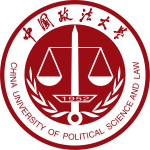
Back جامعة الصين للعلوم السياسية والقانون Arabic جامعة الصين للعلوم السياسيه والقانون ARZ Chinesische Universität für Politikwissenschaft und Recht German Ĉina Universitato de Politiko kaj Juro Esperanto 中国政法大学 Japanese چائنا یونیورسٹی آف پولیٹیکل سائنس اینڈ لا Urdu 中国政法大学 Chinese 中國政法大學 ZH-CLASSICAL 中國政法大學 ZH-YUE
中国政法大学 | |
 | |
| Motto | 厚德、明法、格物、致公 |
|---|---|
| Type | Public research university |
| Established | 1952 |
| President | Ma Huaide (马怀德) |
Academic staff | 951 (2015) |
| Undergraduates | 8,727 (2015) |
| Postgraduates | 6,110 (2015) |
| Location | , China 39°57′50″N 116°20′41″E / 39.9638°N 116.3447°E |
| Website | cupl.edu.cn |
The China University of Political Science and Law (CUPL; Chinese: 中国政法大学; pinyin: Zhōng Guó Zhèng Fǎ Dà Xué), also translated as Zhengfa University,[1][2][3][4][5][6][7] is a national public university in Beijing, China. It is affiliated with the Ministry of Education and co-sponsored with the Beijing Municipal People's Government. The university is part of Project 211 and the Double First-Class Construction.
The university has a strong emphasis on the research and teaching of law, politics, economics, management, sociology, history, and philosophy. CUPL has two campuses, one in Haidian as the original campus of the university, and the other located in Changping. At present, Haidian campus only conducts postgraduate education while undergraduates study on the larger Changping campus. In 2015, CUPL comprises 13 schools, with 15,833 students and 951 faculty members, of whom 290 are professors.[8] CUPL maintains a broad international exchange program, with approximately 1000 foreign students from many countries.
- ^ "Home-法大知识产权网". ipr.cupl.edu.cn. Retrieved 2024-06-08.
- ^ "Personal". sites.socsci.uci.edu. Retrieved 2024-06-08.
- ^ L, Aaron (2019-11-15). "Retracing Steps at Beijing University, 1989-2019". The Asia-Pacific Journal: Japan Focus. Retrieved 2024-06-08.
- ^ MOSHER, STACY (2004). "TIANANMEN'S MOST WANTED—WHERE ARE THEY NOW?" (PDF). China Rights Forum (2): 49–51.
- ^ ISJ (2006-02-02). "China's economy and Europe's crisis • International Socialism". International Socialism. Retrieved 2024-06-08.
- ^ Allen, Ronald J. (24 March 2015). "Reforming the Law of Evidence (Part Three): The Foundations of the Law of Evidence and Their Implications for Developing Countries". Boston University International Law Journal.
- ^ Allen, Ronald J. (2007). "The Jurisprudential and Political Foundation of Criminal Procedure". Zheng ju ke xue. 15 (1): 170–180.
- ^ "师资队伍-中国政法大学". www.cupl.edu.cn. Retrieved 2016-12-11.